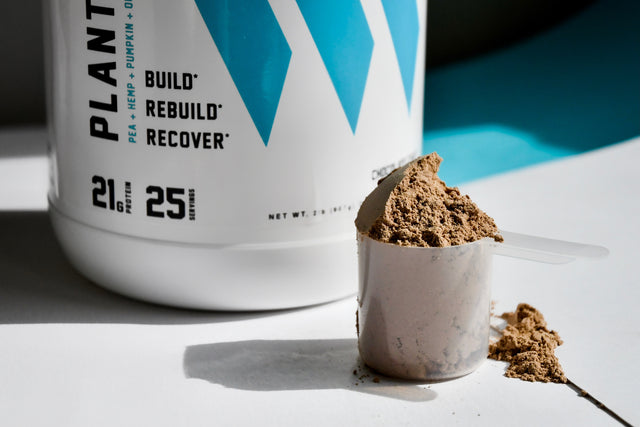Lactic acid is a pain. Actually, more like a burning sensation. But you get the picture. Lactic acid is a by-product of strenuous exercise. Your muscles are always naturally producing lactate, however when you’re training, hitting a higher number of reps, or pushing through 100kcal on the Assault bike, your body produces lactate at a faster rate than it can be removed, otherwise known as your lactate threshold, or the upper limit of your exercise capacity. Too much lactate in your blood, produces a burning sensation, which is then followed by a loss of power. This of course can be problematic for athletes, since the person who can hold off lactic acid the longest, will have better performance. We’re going to talk about the process by which lactic acid is generated and how to delay muscle fatigue by counteracting and preventing your lactic acid buildup.
Why Does Lactic Acid Build Up In Your Muscles?
As your heart rate begins to rise, your breathing will become heavier and faster, shuttling more oxygen into your muscles. Your body generates energy, while performing aerobic exercise or exercise “with oxygen”. Some exercise modalities however, such as repeatedly lifting heavy objects off the ground, requires more energy production faster than your body can adequately deliver oxygen. As this takes place, your body starts to produce energy anaerobically "without oxygen" – generating energy from glucose from the carbohydrates you consume, through a process called glycolysis. Glucose is broken down or metabolized into a substance called pyruvate through a series of biological reactions. If your body has a sufficient amount of oxygen, pyruvate is shuttled to an aerobic pathway to create more energy. However, if your oxygen supply is limited, pyruvate is converted into a substance called lactate – producing more energy through the breakdown of glucose.
High lactate levels increase muscle acidity and disrupt other metabolites. The same metabolic pathway which facilitates the breakdown of glucose to energy performs poorly in this acidic environment. Your body produces lactate as a natural defense mechanism; to prevent permanent damage from extreme exertion from slowing down key biological systems to maintain muscle contraction. Too much lactate in the blood stream, creates a burning sensation in the muscle, resulting in a loss of power, as you meet what’s known as your lactic acid threshold. When your body slows down, oxygen becomes more readily available, while lactate reverts back to pyruvate, allowing continued aerobic metabolism and energy production for the body to adequately recover from exercise.
Does Lactic Acid Cause Muscle Soreness
Lactic acid is not responsible for increased perceived muscle soreness following exercise. Lactate production and other metabolites during strenuous exercise, results in the burning sensation in the muscles, yet through which metabolites this happens, still remains unclear. Research has shown little association with delayed onset muscle fatigue (DOMS) and lactic acid levels.
The exact cause of DOMs still remains unknown, although most research shows that DOMS is created from muscle cell damage and tissues surrounding the muscle cells. The response to strenuous exercise and over exertion results in an inflammatory response, leading to muscle pain and damage dependent upon the severity of the damage. Anti-inflammatory agents such as Turmeric can be used in response to help reduce swelling and inflammation.
“Whoever can hold off lactic acid the longest, is going to outperform their competition” – Mat Fraser 5 Time Fittest Man On Earth
How To Prevent Lactic Acid Buildup In Your Muscles
Reverberating Mat Fraser’s words, whoever can hold off lactic acid the longest, will outperform their competition. High intensity and endurance training, requires long bouts of prolonged exercise performance, which results in lactate accumulation, causing muscle fatigue and a loss of power. CrossFit for example, involves a series of constantly varied movements, at high volumes, often involving several consecutive exercises, Olympic lifts, with little to no rest intervals either for time, or as many reps as possible. Triathletes also deal with lactic acid accumulation however heart rate and VO2 max also play a vital role in performance, during prolonged exercise bouts while cycling, swimming, or running. The biggest difference, is that resistance training, and lifting heavier loads, for high volumes, will increase lactate at a much faster rate.
There are a few ways in which you can effectively reduce lactic acid build up, increasing your lactic acid threshold and delay muscle fatigue with things such as adequate hydration, breathing techniques, and specific supplements that can help reduce lactic acid buildup.
What Are The Best Supplements To Prevent Lactic Acid Buildup?
Beta-Alanine

Beta-alanine is a naturally occurring or non-essential amino-acid, specifically classified as a beta-amino acid. It’s produced naturally in the liver and can be obtained through dietary sources such as chicken, meat, and fish. Beta-alanine facilitates the synthesis of muscle carnosine concentration in the body, which acts as a lactic acid buffer and delays the onset of muscle fatigue, loss of power, and time to failure.
When you work out, your body relies on glucose for energy, which results in the production of lactic acid increasing muscle acidity. Lactic acid is created from the buildup of hydrogen ions (H+), which causes your muscles pH to drop, therefore when lactic acid rises, it linearly increases the acidity in your muscle tissue. When acidity increases your muscles lose the ability to contract and results in a loss of endurance and power. Beta-alanine, specifically the patented ingredient CarnoSyn® buffers hydrogen through an increase in carnosine content, which will help your muscles contract for a longer period of time and delay the onset of fatigue.
Numerous studies have shown that supplementing with CarnoSyn Beta-Alanine improves muscle carnosine concentrations to help delay muscle fatigue and counteract the build-up of lactic acid.
A study published in the Journal of Medical & Science In Sports & Exercise examined the effects of muscle carnosine content and endurance cycling capacity after 24 weeks of supplementation in cyclists. The study showed that supplementing with CarnoSyn Beta-Alanine increased muscle carnosine content and improved high-intensity cycling capacity at every time-interval [R, R].
RELATED ARTICLE The Best Supplement For Increasing Endurance
CoQ10

CoQ10 is a fat-soluble vitamin-like molecule, which serves as a potent antioxidant and that facilitates the biological process of generating adenosine triphosphate [ATP] or energy metabolism. ATP powers every single human cellular action that your body performs. Studies have shown that CoQ10 is one of the best vitamins or endurance, since it has a direct effect on muscle ergogenics.
CoQ10 works to increase cellular efficiency, therefore it enables your body to generate more ATP, helping you produce more power, reducing lactic acid, and enhancing your athletic performance.
RELATED ARTICLE The Ultimate Guide To CoQ10
In a randomized double-blind, placebo-controlled study, published in the Journal Of The International Society Of Sports Nutrition at Baylor University, 41 individuals, (22 aerobically trained, and 19 untrained) between the ages of 26-33 were administered either 100mg of CoQ10 twice per day (200mg) for 14 days, or a dextrose placebo. The results showed that CoQ10 supplementation increased maximum oxygen consumption, thus increasing time to exhaustion and delaying muscle fatigue, since it inhibited lactic acid buildup, with better oxygen metabolism.
These findings demonstrate that CoQ10 supplementation can greatly benefit endurance athletes, to help prolong exercise capacity, peak power, and increase time to exhaustion, by improving oxygen metabolism and preventing lactic acid buildup.
Citrulline Malate

When it comes to cumulative performance measures, citrulline malate checks all the boxes. Citrulline Malate is a powerful combination of two ingredients, L-Citrulline a nonessential amino acid and malic acid. Through this unique mixture, Citrulline Malate has been proven to elicit positive performance outcomes in power, strength, and recovery through several mechanisms.
Citrulline Malate enhances peak power through creating more ATP, nitric oxide, and stimulating muscle protein synthesis. Told you – it checks all the boxes.
RELATED ARTICLE The Ultimate Guide To Citrulline Malate
Studies show that through these mechanisms Citrulline Malate may help prevent lactic acid buildup. However the available evidence concluding that Citrulline Malate works specifically to reduce blood lactate is still a bit mixed.
One study found a 50% decrease in blood lactate levels intra-workout by supplementing with Citrulline Malate [R]. Yet a systematic review published in the Journal of Health Science, investigating the effects of citrulline on post-exercise rating of perceived exertion, muscle soreness, and blood lactate levels, concluded that Citrulline supplements significantly reduced post-exercise RPE and muscle soreness without affecting blood lactate levels [R]. Therefore, more research is needed to determine whether or not citrulline malate reduces lactic acid buildup without doubt.
How To Prevent Lactic Acid Buildup In Your Muscles: Takeaway
Lactic acid is a natural by product of your training. But, if you can increase time to exhaustion, by adequately reducing lactic acid buildup, you'll unequivocally improve exercise performance and go harder for a longer period of time. Reduced lactic acid, will result in higher rep volume, improved workout duration, increased strength and hypertrophy, faster times, and improved peak power. Sufficient hydration throughout the day, in addition to sports perfomance supplements can help you prevent lactic acid buildup in your muscles, and help you push the bounds of your training capacity.
Looking for the best CarnoSyn Beta-Alanine to increase your endurance?
References
Kiyici F, Eroğlu H, Kishali NF, Burmaoglu G. The Effect of Citrulline/Malate on Blood Lactate Levels in Intensive Exercise. Biochem Genet. 2017 Dec;55(5-6):387-394. doi: 10.1007/s10528-017-9807-8. Epub 2017 Jun 29. PMID: 28664349.
Rhim HC, Kim SJ, Park J, Jang KM. Effect of citrulline on post-exercise rating of perceived exertion, muscle soreness, and blood lactate levels: A systematic review and meta-analysis. J Sport Health Sci. 2020 Dec;9(6):553-561. doi: 10.1016/j.jshs.2020.02.003. Epub 2020 Feb 8. PMID: 33308806; PMCID: PMC7749242.














